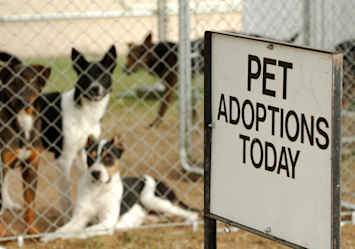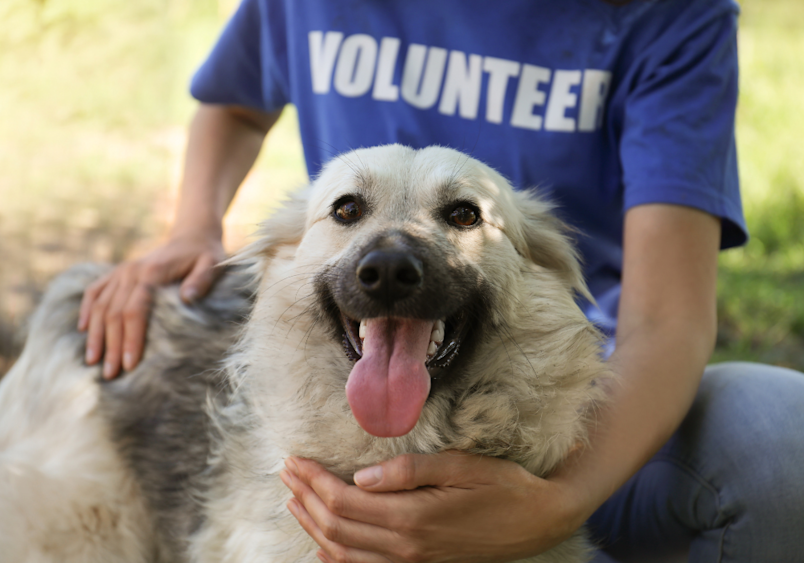
Adopting a dog is a life-changing journey filled with love, laughter, and loyalty. It's also a big responsibility, so before you bring a furry friend into your life, it's essential to consider the financial commitments involved. Understanding the costs of adopting a dog ensures that you are fully prepared to provide the care and attention your new companion deserves.
While the emotional rewards of dog ownership are immeasurable, the financial aspects are just as significant. Knowing what to expect in terms of costs can help you make an informed decision, avoid unexpected financial strain, and ensure that your dog enjoys a happy, healthy life.
While you might be asking yourself how much does adopting a dog cost, the truth is that the cost of adopting a dog can vary widely depending on several factors. These include the adoption fees set by shelters or rescue organizations, the initial setup costs for essential supplies, ongoing monthly expenses, and potential healthcare or grooming needs. Understanding these factors can help you budget effectively and prepare for the long-term financial commitment of dog ownership.
Adoption Fees
Adoption fees are the initial cost you’ll encounter when bringing a dog home from a shelter or rescue organization. These fees can differ significantly based on various elements.
Adoption fees can range anywhere from $50 to $500, depending on the organization. Local animal shelters and municipal animal control facilities tend to have lower fees, often ranging from $50 to $150. On the other hand, breed-specific rescues or private shelters may charge higher fees.
Several factors influence the adoption fees, including the location of the shelter, the age and breed of the dog, the time of year, and the amount of resources invested in the dog’s care, like spaying/neutering, vaccinations, and microchipping. For example, puppies and purebred dogs often have higher adoption fees due to their popularity and demand. Additionally, adoption fees may be reduced during special events or when shelters are at capacity. Some higher adoption fees may also include ensuring the dog is up to date on all vaccinations, microchipped, and spayed or neutered.
Initial Setup and Supplies for Your Newly Adopted Dog
When you rescue a new dog, you’ll have to invest in an initial setup and supplies. These items ensure your dog has everything they need to settle into their new environment comfortably.
The essentials for a new dog include a collar and leash, food and water bowls, a comfortable bed, grooming tools, toys, and a crate for training and safety. You may also need to purchase treats and a basic first-aid kit.
Here’s a rough estimate of the costs for these essential items:
Collar and leash | $20 - $50 |
Food and water bowls | $10 - $30 |
Dog bed | $30 - $80 |
Grooming tools | $20 - $80 |
Toys | $10 - $50 |
Crate | $40 - $100 |
Treats | $10 – $30 |
First aid kit & supplies | $20 - $60 |
Overall, you can expect to spend between $160 and $480 on your initial dog setup and supplies for your new dog. The good news is that many of these items will last you for the lifetime of your dog!
Monthly Costs of Owning a Dog
After you Adopt Of course, dogs are an ongoing commitment and responsibility, so it’s important to be prepared for the monthly expenses of owning a dog that can add up over time. Being prepared and budgeting for these costs ensures you can give your dog the care they need.
Monthly expenses for a dog typically include food, veterinary care, grooming, and pet insurance. Here’s a breakdown:
Food: Depending on the size and dietary needs of your dog, you can expect to spend anywhere from $30 - $100 per month. Larger breed dogs or dogs requiring specialized food, like hypoallergenic or homemade, will be more expensive.
Medication and Veterinary Care: The amount of money you’ll spend on your dog for medications and veterinary care will be dependent on your dog’s overall health and age. A routine check-up can cost $40 - $80, and sick or emergency visits can be even more. Monthly flea/tick and heartworm medications can be anywhere from $20 - $50 per month, depending on the size of your dog and the specific medication.
Grooming: Your dog’s grooming needs will vary widely depending on size and coat type. Grooming your dog at home with basic supplies like a brush, nail clippers, and shampoo will be less expensive and can average $10 - $50 per month. Having your dog professionally groomed is more expensive and can range from $50 - $120 per session every 4-8 weeks.
Environmental Supplies: Unfortunately, there will be times that you need to clean up a mess or replace your dog’s blanket, but these costs are less expensive and infrequent. Things like replacing your dog’s blanket, buying a cleaning spray, and purchasing new waste bags should only cost about $10 - $40 per month.
Entertainment: It’s incredibly important to keep your dog entertained. Not only is it necessary to keep them mentally enriched, but it will also help them be less destructive and decrease the chance of them destroying your belongings. Buying new toys and treats should only cost about $10 - $40 per month.
Pet Insurance: Investing in pet insurance not only gives you peace of mind that you can ensure your dog is able to get any medical care they need, but it can offset the financial stress in an emergency. Insurance premiums can vary but typically cost between $20 - $80 per month.
Several factors influence monthly costs, including the size of your dog, their age, and any special health or dietary needs. Larger dogs require more food, while older dogs may need more frequent veterinary visits and medications. Additionally, dogs with long or thick coats may require regular professional grooming, but it’s easy to maintain a short-coated dog at home with regular brushing. Younger dogs that are aggressive chewers may need more entertainment, but older dogs are less likely to regularly need new toys monthly.

Healthcare Expenses of an Adopted Dog
Keeping your dog healthy is one of the most important aspects of responsible pet ownership. Healthcare expenses can vary depending on your dog’s needs and any unexpected medical issues.
Routine healthcare includes annual check-ups, vaccinations, flea and tick prevention, and heartworm medication. These preventive measures are essential for keeping your dog healthy and can cost between $200 and $500 per year. Being proactive and maintaining your dog’s yearly check-ups can help keep them healthier, but it’s an unfortunate reality that sometimes medical emergencies come up.
Pet insurance is a valuable tool for managing unexpected healthcare costs, like illnesses and emergencies. It can help cover the costs of accidents, illnesses, and even routine care, depending on your plan. Investing in pet health insurance helps you not only offset the financial burden of an unexpected cost, but it can give you an incredible peace of mind, Visit Embrace to know that you can always make sure your dog gets the care they need when they need it.
You may want to consider adding on a wellness plan. This is not insurance, but is more of a budgeting tool that can help you pay for checkups, vaccinations, grooming, and training costs—and can even save you some money in the long run!
Average Dog Grooming Costs for Your Rescued Dog
Grooming is an essential part of keeping your dog clean and comfortable. The cost of grooming can vary greatly depending on whether you choose to groom your dog at home yourself or opt for a professional grooming service.
Professional grooming services can be convenient, especially for breeds that require regular haircuts or specialized care. However, these services can cost between $40 and $120 per session, depending on the size, breed, and coat type of your dog. Dogs with long, thick, or curly coats may require more frequent grooming and specialized care, thus increasing the overall grooming costs.
DIY grooming at home is a much more budget-friendly option, but it requires an initial investment in grooming tools and a willingness to learn the basics of dog grooming. Purchasing these tools should only cost between $20 - $80, and they should only need to be replaced very infrequently when they become dull or broken.
Additional Costs to Consider of Adopting a Dog
Training and behavioral classes: Both puppies and adults can benefit from training classes! Training classes can help your dog learn basic obedience and socialization skills, plus they are a good way to bond with your dog. These classes can cost between $100 and $300 for a multi-week course.
Home modifications: Sometimes it’s necessary to spend money to keep your dog safe at home. These modifications can include things like installing a fence or purchasing baby gates, and this can add to the overall cost of owning a dog.
Pet sitters and boarding: If you travel with your dog, you may need to budget for pet-friendly accommodations, travel gear, or boarding services. If you travel frequently, you may need to hire a pet sitter to stay at home or board your dog while away. This can cost anywhere from $30 - $80 per night.
Dog walkers or dog daycare: If you work long hours, you may consider hiring a dog walker to walk your dog during the workday or dropping them off at daycare to play with their dog friends. This can cost anywhere from $20 - $50 per day.
There’s no way around it, owning a dog can sometimes come with hidden or unexpected costs, such as emergency veterinary visits, damage to furniture or belongings, and the need for additional supplies or services. Being financially prepared for these hidden costs is crucial for ensuring your dog’s wellbeing.
Saving Money on Dog Care for your Rescue Dog
While dog ownership can be expensive, there are several ways to save money without compromising your dog’s care.
Buy in bulk: Purchasing food, treats, and supplies in bulk can help reduce costs.
DIY grooming: Learning to groom your dog at home can save money on professional services.
DIY toys: You don’t have to spend a ton of money on dog toys to keep your dog entertained. You can play games inside the house or with recycled boxes to minimize the cost while still entertaining your dog.
Preventive care: Staying on top of regular check-ups, vaccinations, and flea/tick prevention can help avoid costly medical issues down the line.
Pet insurance: How much is pet insurance and should you get it? Investing in pet insurance can offset the financial burden from unexpected emergency medical expenses. Once you fall in love with your pup, you’ll do anything to save them. Pet insurance costs of $20-$80/month makes sure you can afford to do that.
Training at home: Supplementing professional training classes with at-home practice can reduce the need for additional classes.
So, What Does It Cost to Adopt a Dog?
Adopting a dog is a rewarding experience, but it’s important to be financially prepared for the associated cost of owning a dog. From adoption fees to ongoing monthly expenses and unexpected healthcare costs, dog ownership requires a significant investment of both time and money. By understanding these costs, budgeting accordingly, and investing in pet insurance, you can cover potential expenses while ensuring your new canine companion enjoys a happy and healthy life. With the peace of mind that comes from being financially prepared, you can focus on what truly matters – building a loving and lasting bond with your new best friend.